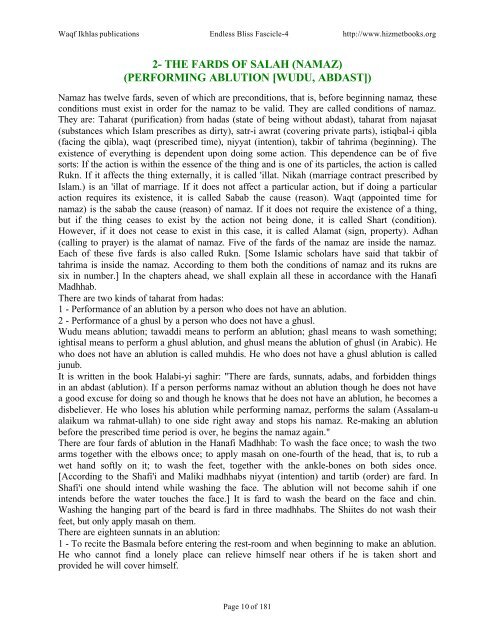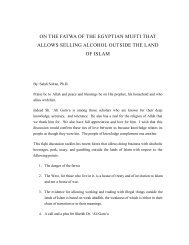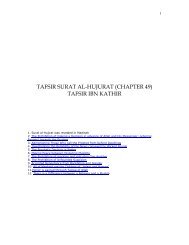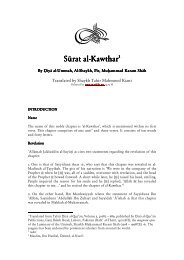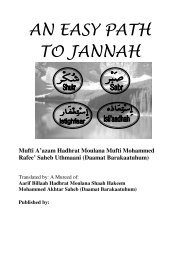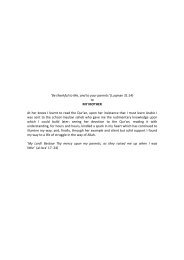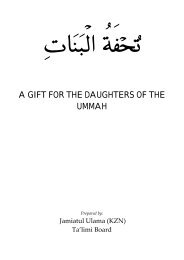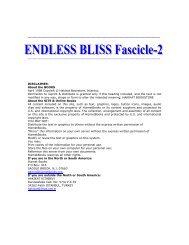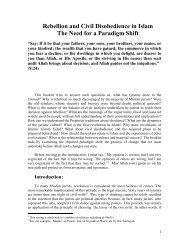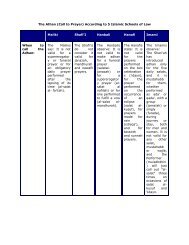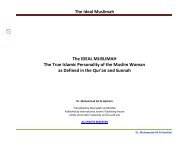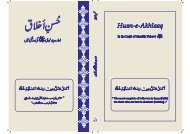ENDLESS BLISS FASCICLE-4
ENDLESS BLISS FASCICLE-4
ENDLESS BLISS FASCICLE-4
Create successful ePaper yourself
Turn your PDF publications into a flip-book with our unique Google optimized e-Paper software.
Waqf Ikhlas publications Endless Bliss Fascicle-4 http://www.hizmetbooks.org<br />
2- THE FARDS OF SALAH (NAMAZ)<br />
(PERFORMING ABLUTION [WUDU, ABDAST])<br />
Namaz has twelve fards, seven of which are preconditions, that is, before beginning namaz, these<br />
conditions must exist in order for the namaz to be valid. They are called conditions of namaz.<br />
They are: Taharat (purification) from hadas (state of being without abdast), taharat from najasat<br />
(substances which Islam prescribes as dirty), satr-i awrat (covering private parts), istiqbal-i qibla<br />
(facing the qibla), waqt (prescribed time), niyyat (intention), takbir of tahrima (beginning). The<br />
existence of everything is dependent upon doing some action. This dependence can be of five<br />
sorts: If the action is within the essence of the thing and is one of its particles, the action is called<br />
Rukn. If it affects the thing externally, it is called 'illat. Nikah (marriage contract prescribed by<br />
Islam.) is an 'illat of marriage. If it does not affect a particular action, but if doing a particular<br />
action requires its existence, it is called Sabab the cause (reason). Waqt (appointed time for<br />
namaz) is the sabab the cause (reason) of namaz. If it does not require the existence of a thing,<br />
but if the thing ceases to exist by the action not being done, it is called Shart (condition).<br />
However, if it does not cease to exist in this case, it is called Alamat (sign, property). Adhan<br />
(calling to prayer) is the alamat of namaz. Five of the fards of the namaz are inside the namaz.<br />
Each of these five fards is also called Rukn. [Some Islamic scholars have said that takbir of<br />
tahrima is inside the namaz. According to them both the conditions of namaz and its rukns are<br />
six in number.] In the chapters ahead, we shall explain all these in accordance with the Hanafi<br />
Madhhab.<br />
There are two kinds of taharat from hadas:<br />
1 - Performance of an ablution by a person who does not have an ablution.<br />
2 - Performance of a ghusl by a person who does not have a ghusl.<br />
Wudu means ablution; tawaddi means to perform an ablution; ghasl means to wash something;<br />
ightisal means to perform a ghusl ablution, and ghusl means the ablution of ghusl (in Arabic). He<br />
who does not have an ablution is called muhdis. He who does not have a ghusl ablution is called<br />
junub.<br />
It is written in the book Halabi-yi saghir: "There are fards, sunnats, adabs, and forbidden things<br />
in an abdast (ablution). If a person performs namaz without an ablution though he does not have<br />
a good excuse for doing so and though he knows that he does not have an ablution, he becomes a<br />
disbeliever. He who loses his ablution while performing namaz, performs the salam (Assalam-u<br />
alaikum wa rahmat-ullah) to one side right away and stops his namaz. Re-making an ablution<br />
before the prescribed time period is over, he begins the namaz again."<br />
There are four fards of ablution in the Hanafi Madhhab: To wash the face once; to wash the two<br />
arms together with the elbows once; to apply masah on one-fourth of the head, that is, to rub a<br />
wet hand softly on it; to wash the feet, together with the ankle-bones on both sides once.<br />
[According to the Shafi'i and Maliki madhhabs niyyat (intention) and tartib (order) are fard. In<br />
Shafi'i one should intend while washing the face. The ablution will not become sahih if one<br />
intends before the water touches the face.] It is fard to wash the beard on the face and chin.<br />
Washing the hanging part of the beard is fard in three madhhabs. The Shiites do not wash their<br />
feet, but only apply masah on them.<br />
There are eighteen sunnats in an ablution:<br />
1 - To recite the Basmala before entering the rest-room and when beginning to make an ablution.<br />
He who cannot find a lonely place can relieve himself near others if he is taken short and<br />
provided he will cover himself.<br />
Page 10 of 181


